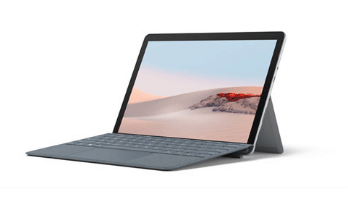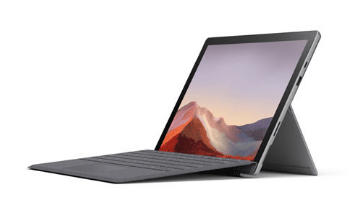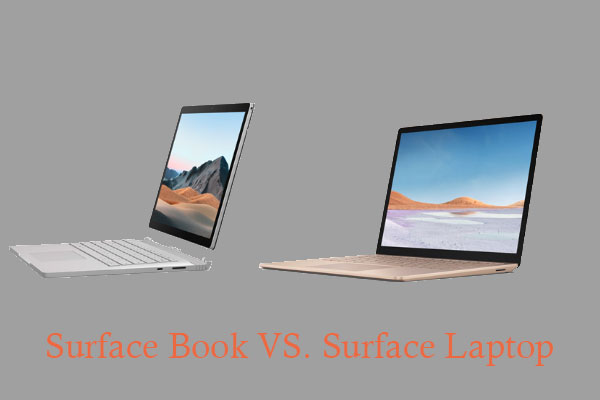Microsoft Surface is a series of personal computing devices designed and manufactured by Microsoft. Its product line includes Surface Pro, Surface Book, Surface Laptop, Surface Go, Surface Studio, and Surface Hub. Among them, some people want to know about Microsoft Surface Go vs Pro. In this post, MiniTool Partition Wizard explains that to you.
Microsoft Surface Go vs Pro Specs
Microsoft Surface Go series includes Surface Go and Surface Go 2. The latter is the newest product of this series at present. Surface Go laptops’ specs are as follows:
| Surface Go | Surface Go 2 | |
| CPU | Intel Pentium Gold Processor 4415Y |
|
| RAM | 4GB or 8GB | |
| GPU | Intel HD Graphics 615 | Intel UHD Graphics 615 |
| Storage | 64GB eMMC drive or 128GB SSD | |
| Display | 10″ PixelSense Display with 1800 x 1200 (217 PPI) resolution | 10.5” PixelSense Display with 1920 x 1280 (220 PPI) resolution |
| Weight | Starting at 522 g | Starting at 544 g |
| Battery Life | Up to 8.5 hours of video playback | Up to 10 hours of typical device usage |
| External Ports | 1 x USB-C, 1 x Surface Connect port, microSDXC card reader | |
| Price | Starting from $399.99 | |
Unlike Microsoft Surface Go, Microsoft Surface Pro series has many models. But if you search Surface Pro laptops on Microsoft official store, it only lists Surface Pro (5th Gen), Surface Pro 6, Surface Pro 7, and Surface Pro X. The last model is the newest product of this series at present. Their specs are as follows:
| Surface Pro (5th Gen) | Surface Pro 6 | Surface Pro 7 | Surface Pro X | |
| CPU | Intel Core 7th-generation m3, i5, or i7 |
|
| Microsoft SQ1 |
| RAM | 4GB, 8GB, or 16GB | 8GB or 16GB | 4GB, 8GB, or 16GB LPDDR4x RAM | 8GB or 16GB LPDDR4x RAM |
| GPU |
|
|
| Microsoft SQ1 Adreno 685 GPU |
| Storage | 128GB, 256GB, 512GB, or 1TB SSD | Removable 128, 256, or 512GB SSD | ||
| Display | 12.3 PixelSense Display with 2736 x 1824 (267 PPI) resolution | 13” PixelSense Display with 2880 x 1920 (267 PPI) resolution | ||
| Weight | Starting at 768 g | Starting at 770 g | Starting at 775 g | Starting at 774g |
| Battery Life | Up to 12.5 hours of local video playback | Up to 13.5 hours of local video playback | Up to 10.5 hours of typical device usage | Up to 13 hours of typical device usage |
| External Ports |
|
|
| |
| Price | Starting from $749 | Starting from $899 | Starting from $749.99 | Starting from $999.99 |
Annotation:
- eMMC: It is a memory card standard. Read eMMC VS SSD Storage to know more about it.
- SIM port: With it, you can connect to network via a SIM card.
- Surface Connect Port: It is a kind of Thunderbolt port. With it, you can connect a Surface Dock to expand ports.
- USB ports: USB type A and USB type C are physical form factors of USB ports. USB 3.0 refers to data transmission protocol. Click USB C vs USB 3.0 to know more.
Microsoft Surface Go vs Pro Market Positioning
Surface Go is an entry-level 2-in-1 computer and the cheapest product in the Surface product line. Surface Go is designed for daily work and entertainment, and can be easily placed in a bag. This device is suitable for running lightweight applications and people who have very high requirements for the volume and weight of a laptop.

Surface Go is a supplementary device for laptop or desktop computers, providing people with functions such as web browsing, e-mail, word processing, note recording, simple drawing and multimedia consumption.
However, Surface Go has a disadvantage that it can only run apps from the Windows Store. If you want to run apps outside of the store, you can only upgrade the system to Windows 10 Pro, but after the upgrade, its performance will be relatively weak and the battery life will be shortened.
As for Surface Pro, it is first positioned as a tablet, followed by a laptop. When you need to travel frequently and have office needs, it is undoubtedly a good choice. If you are a student, need a computer to take notes, usually do PPT, write and write Word, work around Office, or you are a painter, then Surface Pro is very worthwhile.

But if what you need is a powerful laptop, Surface Pro is not recommended. At the same price, there are too many thin and light options whose weight, performance, or price are better than Surface Pro.


User Comments :